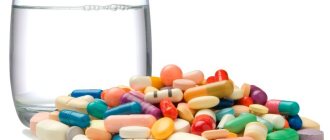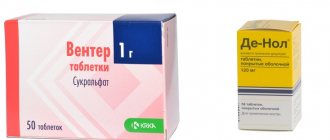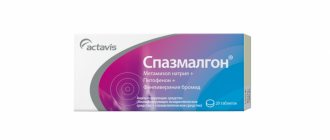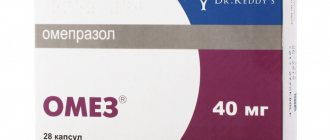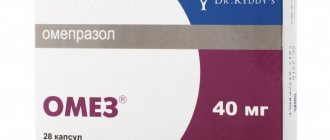Drug interactions
When taking Acyloc at the same time:
- metoprolol - increases the half-life, increasing its concentration in the blood serum by 50%;
- itraconazole and ketoconazole - reduce absorption;
- antacids, sucralfate in high doses - can slow down the absorption of ranitidine (it is recommended to maintain an interval of at least two hours between doses of these drugs);
- Bone marrow depressants – increase the risk of developing neutropenia.
Ranitidine inhibits the metabolism in the liver of aminophenazone, phenazone, diazepam, hexobarbital, diazepam, lidocaine, propranolol, phenytoin, theophylline, indirect anticoagulants, glipizide, aminophylline, buformin, calcium antagonists, metronidazole.
Price
The cost of a medicine is determined based on a number of external factors, which include the pharmacy’s markup, the costs incurred by the company for transporting the goods, as well as the purchase price.
Important! You should find out the exact cost of the medicine at your nearest pharmacy.
Russia
The price for Atsilok was set at 270 rubles.
Ukraine
For the same drug you will have to pay on average 156.34 hryvnia.
Video on the topic: Nutrition for gastritis, Tibet Clinic
Acilok's analogues
Level 4 ATC code matches: Gastrosidine
Gistac
Ranitidine
Cimetidine
Zantac
Kvamatel
Famotidine
There are structural substitutes:
- Ranitidine;
- Ranitidine-Acree;
- Ranitidine-AKOS.
Indications for use
Film-coated tablets
- stomach and duodenal ulcers that occurred while taking non-steroidal anti-inflammatory drugs (NSAIDs);
- prevention of exacerbations and treatment of gastric and duodenal ulcers;
- prevention of recurrent bleeding from the upper gastrointestinal tract (GIT);
- Zollinger-Ellison syndrome;
- erosive esophagitis, reflux esophagitis;
- prevention of aspiration of gastric juice during operations under general anesthesia (Mendelssohn syndrome);
- prevention and treatment of ulcers of the upper gastrointestinal tract that occur after surgery or stress.
Solution for intravenous and intramuscular administration
- prevention of recurrent bleeding in gastric and/or duodenal ulcers and bleeding in stress ulcers;
- prevention of Mendelssohn's syndrome.
Reviews
The drug is very effective, and purchasing the drug is quite simple.
Due to the modern pace of life, where fast foods and the lack of an active lifestyle play a predominant role, antiulcer drugs can be found in any human medicine cabinet.
The medicine Atsilok is not only a medicine, but also an excellent preventive measure.
Many patients are interested in the question of whether it is possible to take the drug for a long period of time, for example, 3-6 years. Doctors, despite the small likelihood of side effects, still advise discussing the possibility of taking the medicine for a long time with your doctor.
What is "Acylok"?
According to the instructions for use, "Acylok" in ampoules is an antiulcer drug of Indian origin, an analogue of "Zoran" and "Gistac". The active ingredient in it is ranitidine. Unlike other drugs, this medication is available not only in tablet form, but also in the form of an injection solution for intravenous or intramuscular administration, which allows the gastroenterologist to make wider use of the capabilities of the drug. Although, of course, the usual form of drugs that reduce acidity in the stomach are tablets. But there are times when it is necessary to administer the drug intravenously. It is for these cases that the described drug is suitable. The difference from tablets is that one ampoule of the solution contains 50 mg of ranitidine - a single dose for injection. One tablet contains 150 mg of active substance.
What else does the instructions for use say about “Atsilok” in ampoules? The ampoule does not contain a ready-made solution for administration. The product must be diluted with sodium chloride, which may present some inconvenience. The drug is a blocker of H2-histamine receptors, which are located in the parietal cells of the gastric mucosa. Parietal cells are those cells that are responsible for the production of hydrochloric acid. Ranitidine suppresses the production of hydrochloric acid in the stomach and reduces the total volume of gastric juice, shifting its pH to the alkaline range, which automatically suppresses the activity of pepsin, which is one of the digestive enzymes. With a decrease in the amount of hydrochloric acid in the stomach, liver enzymes that are associated with cytochrome P 450 are practically not suppressed, the concentration of gastrin in the plasma does not decrease, and mucus synthesis is not suppressed. "Acylok" is used both for the treatment and prevention of stomach and duodenal ulcers, as well as for some other disorders of the digestive system. The main active component of the drug helps strengthen the protective mechanisms of the gastric mucosa and potentiates the healing process of damage caused by hydrochloric acid (including promoting healing of stress ulcers and preventing gastric bleeding) through the formation of gastric mucus. This is confirmed by the instructions for using "Atsilok" in ampoules.
Release form and composition
Dosage forms:
- film-coated tablets: biconvex, 150 mg - round, 300 mg - capsule-shaped, film-coated - green (10 pieces in aluminum strips, 2 or 10 strips in a cardboard box);
- solution for intravenous (IV) and intramuscular (IM) administration: transparent liquid from pale yellow to colorless (2 ml in ampoules, 5 ampoules in a blister, 1 blister in a cardboard box).
1 tablet contains:
- active ingredient: ranitidine (in the form of hydrochloride) – 150 mg or 300 mg;
- auxiliary components: calcium stearate, granulated calcium hydrogen phosphate, sodium carboxymethyl starch, sodium hydrogen phosphate, microcrystalline cellulose, colloidal silicon dioxide (aerosil), croscarmellose sodium, Opadry green dye.
1 ml of solution contains:
- active ingredient: ranitidine (in the form of hydrochloride) – 25 mg;
- auxiliary components: phenol, sodium hydrogen phosphate dihydrate, potassium dihydrogen phosphate, water for injection.
Side effects
In isolated cases, the patient may experience effects such as:
- AV block;
- Any form of hepatitis, constipation;
- dizziness, blurred vision, hallucinations, headache, confusion, feeling tired;
- Leukopenia, thrombocytopenia;
- Gynecomastia, decreased libido, amenorrhea, and impotence;
- Myalgia, as well as arthralgia;
- Urticaria, anaphylactic shock, hypotension, skin rash, angioedema, bronchospasm;
- Hair loss, as well as mumps.
Such tablets for gastritis and ulcers are not able to cure ulcerative lesions in the stomach, but they effectively relieve pain and symptoms of heartburn.
Overdose
In case of an overdose, a person experiences the development of such consequences as:
- Abdominal/back/head pain;
- Tachycardia, AV block;
- Acute pain in the limbs;
- Loss of appetite, which may be accompanied by flatulence;
- Depression, loss of orientation;
- Decreased vision, hearing;
- Hepatitis, constipation or diarrhea;
- Arthralgia, myalgia;
- In severe cases, hallucinations are observed.
In case of prolonged excess of the dosage, leukopenia, bronchospasm, amenorrhea, gynecomastia, and impotence may develop. In addition, a person experiences redness of the skin, itching, peeling, and increased blood pressure.
If these conditions appear, the person must immediately stop taking this medication. After this, the person should take special medications or call an ambulance and follow all the recommendations given by the doctor on duty.
Contraindications
Important! Doctors do not recommend trying to cure yourself, because... If the dose or duration of administration is incorrectly selected, significant harm can be caused to an already affected body.
The medicine should not be taken if you are allergic to certain components of the drug Acylok.
Pregnancy
During pregnancy and breastfeeding, you should refrain from using any medications, including the drug Acyloc. If the dose cannot be postponed, then use is allowed, but only after consultation with a doctor.
Contraindications
Pregnancy and breastfeeding are contraindications for the use of this drug. If during breastfeeding there is a need to take this drug, then the child must be switched to artificial nutrition. Clinical studies on the use of this drug in pediatrics have not been conducted, therefore it is not used in childhood; the medicine can be prescribed from the age of twelve. If individual intolerance to the components of the drug occurs, it is canceled.
Directions
This section discusses important points regarding admission conditions.
Impact on the driver
This drug affects the human driver. Doctors advise staying at home if possible.
Pregnancy
During lactation, breastfeeding should be stopped. Pregnancy is an exciting time in the life of every girl. That is why it is extremely undesirable to take this remedy at this time. This is especially true in the first trimester.
In addition, it is highly undesirable to take this medicine while breastfeeding your baby.
How to take Acilac for children?
No data was provided on the use of the medicine by children.
How should senior citizens take the product?
Dose adjustment is required.
Kidneys
With extreme caution.
Liver
If you have liver diseases, you should not take the medicine.
Release from pharmacy
On prescription.
- See our article “The best folk remedy for gastritis!” To get rid of it QUICKLY and FOREVER...
- How to get rid of gases in the intestines and why do they occur?
- Activated carbon cleaning - is it worth starting?
